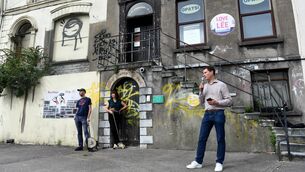Michael Collins's expertise could have prevented economic meltdown
This terrible statistic is part of the aftershock from the blow delivered to Ireland by a variety of corrupt and lazy politicians, senior civil servants, bankers, businessmen, lawyers, accountants, and stockbrokers.
We have lost our economic sovereignty. Our young people are shoaling out of the country. There is an army of unemployed and we are told that we have given some €65bn to “our” banks. They have reciprocated, not by lending to industry, but by allowing jumped-up bank clerks to tell decent people that they can’t have Sky television and that €10 a day is too much money to spend on food.
Today, on the 91st anniversary of Michael Collins’ death, I think it would be instructive, and beneficial, for society as a whole to ask what Collins would have done about the banks and the situation they were allowed to create?
Firstly, it should be said that he would not have allowed the crisis to occur. He was skilled in financial matters, having worked in London’s financial industry, and he hated waste. Before going on, this point should be emphasised because recently efforts have been made to denigrate his abilities.
Inside Dermot Ferriter there is a fine historian trying to get out, but he is currently restrained by the self-imposed straitjacket following the publication of his hagiographical work on de Valera, which a Fianna Fáil minister installed in every secondary school in the land. As part of the de Valera build-up, Mr Ferriter tried to pull down Collins.
In a recent article in The Irish Times, he claimed that Collins was responsible for the unimaginative British Treasury policies of our Department of Finance and said that his celebrated collection of speeches, Path to Freedom, showed little merit.
In fact, the man who set the Irish Department of Finance on the British path was an English senior civil servant, CJ Gregg, a friend of W T Cosgrave. A man with at least as great a claim to economic expertise as Mr Ferriter, Seán Lemass is on record as saying that it was Collins’ Path to Freedom that fired his interest in economics.
One can also turn to a memorandum Collins sent Desmond Fitzgerald shortly before he was killed for examples of far-seeing, internationalist thinking. He cited the examples of countries such as Germany, Denmark, Holland, and Switzerland for guidance in agricultural matters, economic development, and hydro power. He saw the new medium of the cinema as a tool of education and argued for a sea-change in our attitude to rural planning.
Specifically, where banks and banking were concerned, we know that he organised a superbly efficient Dáil loan and had a banking inspector who attempted to interfere with it, Alan Bell, shot dead. He did not hesitate to threaten force when banks policies threatened the newly formed Irish Free State.
When the Bank of Ireland refused the government a loan, Collins said that he was withdrawing the army guard from the bank’s headquarters: In fact there was no guard but Collins got the loan.
When the British proposed to transfer the Registry of British Government Stock from Dublin to Belfast and London, his reaction was ruthless and unequivocal: “There are several retaliatory measures we could take, and in fact must take if things of this kind go on.”
“Things” did not go on, the register stayed in Dublin, and a number of other moves initiated by the unionists were countered.
It is glaringly obvious that our society has been hit by a tsunami of reckless trading and a blatant disregard for the fiduciary responsibility of directors, but where are the prosecutions? Nobody has been held accountable for this, and as a mood of anger and despair grips the country — nobody goes to jail. The buck stops nowhere.
We are currently suffering two legal impediments to justice. One is the lack of Fraud Squad back-up. The Government and opposition are hiding behind the public service embargo to prevent the appointment of the forensic accountants, barristers, and solicitors required in white-collar crime cases.
The second was the failure of the Government to carry the referendum which would have allowed Dáil committees investigative powers and the ability to make findings of fact. That campaign should be revisited and carried through to fruition.
One of the mortal wounds the referendum campaign suffered was a round-robin letter from ex-attorneys general objecting to the committees on the grounds that they would interfere with a man’s right to his good name and the independence of the judiciary.
One of the signatories to that letter had been chairman of Allied Irish Banks, Dermot Gleeson. Another was Michael McDowell, who did not allow his concern for a man’s good name to prevent him handing a document from his office, whilst he was minister for justice and tánaiste, to the Irish Independent.
The document helped to fuel the controversy over whether Frank Connolly had visited his brother in jail in Columbia on a false passport. In the ensuing uproar, the Public Inquiry Institute funded by Chuck Feeney, the philanthropist who gave billions to this country, dissolved; with it went Frank Connolly’s role as chief investigative journalist. Bertie Ahern defended the government’s role on the grounds that no other country would allow an outside agency to supply information about its affairs. In the welter of controversy, the public failed to learn that the story Connolly and his staff had been working on had been Bertie Ahern’s financial affairs.
A plethora of political assistants have been employed but, because, we are told, of the public service embargo, the State has not given its major, anti-white-collar crime units, the Criminal Assets Bureau and the fraud squad, the tools they need to do their job. In fact, during the relevant period, fraud squad resources have been cut.
I believe unquestionably Collins would have initiated strong action against the unholy collection of professionals who have done so much to validate George Bernard Shaw’s dictum that all professions are a conspiracy against the public.
I believe Collins would have ended the farce of a de facto collusion between government and opposition to avoid prosecuting the guilty and given the Fraud Squad the tools it would have needed to do the job. Without the requisite forensic accountants, solicitors and barristers, the Garda units attempting court proceedings are like rugby teams crossing the line without the ball.















